RAIL AND ROAD LEADERS AT LUNCHEON.
Page 34
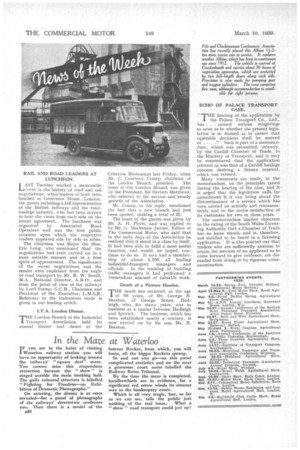
Page 35
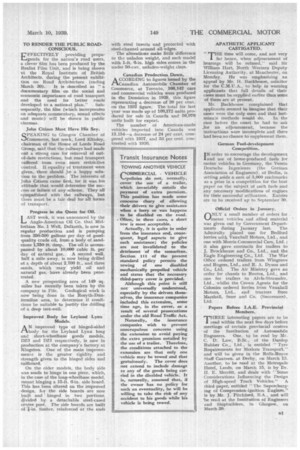
Page 36
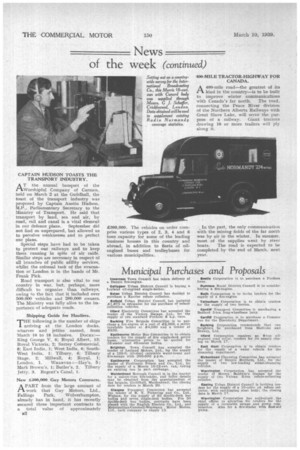
Page 37
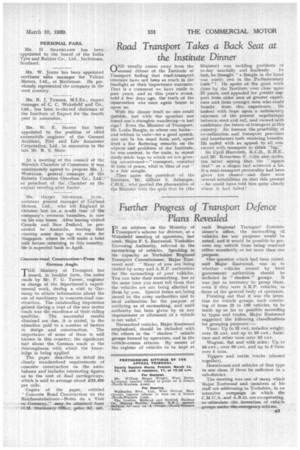
Page 38
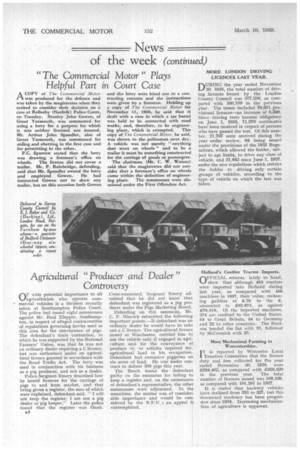
If you've noticed an error in this article please click here to report it so we can fix it.
LAST Tuesday marked a memorable vent in the history of road and rail negotiations, when leaders of both sides lunched at Grosvenor House, London. the guests including a full representation of the British tailways and the roadhaulage industry, who had been invited to hear the views from each side on the recent agreement. The luncheon was organized by Associated Road Operators and was the first public occasion upon which the respective leaders appeared side by side as allies.
The chairman was Major the Hon. Eric Long, who mentioned that the negotiations had been carried on in a most amiable manner and in a true spirit of appeasement. The significance of the recent negotiations and the results were explained from the angle of road transport by Mr. R. W. Sewill, M.A., National Director, A.R.O., and from the point of view of the railways by Lord Stamp, G.C.B., Chairman and President of the Executive, L.M.S.R. Reference to the statements made is given in our leading article.
I.T.A. London Dinner.
THE London Branch of the Industrial Transport Association held its annual dinner and dance at the
Criterion Restaurant last Friday, when Mr. C. Courtney Cramp, chairman of the London Branch, presided. The toast of the London Branch was given by the President, Sir Herbert Matthews, who referred to the success and'steady growth of the Association.
Mr. Cramp, in his reply, mentioned the fact that a new branch had just been opened, making a total of 25.
The toast of the guests was given by Mr. A. H. Pavis, and was replied to by Mr. G. Mackenzie junner, Editor of The Commercial Motor, who said that in the early days of the Association he realized that it stood in a class by itself. It had been able to fulfil a most useful function, and would, he hoped, continue to do so. It now had a membership of about 1,100, all leading industrial-transport managers and officials. In the training of budding traffic managers it had performed a tremendous amount of valuable work.
Death of a Pioneer Haulier.
THE death has occurred, at the age of GS years, of Mr. George B. Beeston, of George Street, Hadleigh, who, for many years, was in business as a carrier between Hadleigh and Ipswich. The business, which has been established nearly a century, is now carried on by his son, Mr. B. Beeston.
ECHO OF PALACE TRANSPORT CASE.
" THE hearing of the application by the Palace Transport Co., Ltd., has . . . caused serious misgivings to arise as to whether the preeent legislation is so framed as to ensure that equitable decisions shall be arrived at . . . ." Such is part of a memorandum, which was submitted, recently, by the Cardiff Chamber of Trade, to the Ministry of Transport, and it may be remembered that the application referred to was that of a Cardiff haulage concern desiring a licence renewal, which was refused.
Many comments are made, in the memorandum, on the principles raised during the hearing of the case, and it is urged that the legislation calls for amendment if it can bring about the discontinuance of a service which has been carried on actively and remuneratively and to the entire satisfaction of its customers for two or three years.
The memorandum implies objection to the ruling of the South Wales Licensing Authority that a Chamber of Trade has no locus standi, and is, therefore, not entitled to be heard in a licensing application. It is also pointed out that traders who are sufficiently anxious to retain the services of an applicant as to come forward to give evidence, are dissuaded from doing so by rigorous crossexamination. TO RENDER THE PUBLIC ROADCONSCIOUS.
EFFECTIVELY providing propaganda for the nation's road users, a clever film has been produced by the Realist Film Unit, and is being shown at the Royal Institute of British Architects, during the present exhibition on Road. Architecture (ending
March 30). It is described as " a documentary film on the social and economic importance of road transport and the need for better roads developed to a national plan." Subsequently, the film (which incorporates an adequate commentary, sound effects and music) will be shown in public cinemas.
John Citizen Must Have His Say.
QPEAKING to Glasgow Chamber of OCommerce, last week, Lord Eltisley, chairman of the House of Lords Road Group, said that the railways had made out a strong case for removal of outof-date restrictions, but road transport suffered from even more restrictive control. If equality of treatment were given, there should be a happy solution to the problem. The interests of John Citizen came first, for it was his attitude that would determine the success or failure of any scheme. They all sympathized with the railways, but there must be a fair deal for all forms of transport.
Progress in the Quest for Oil.
LAST week, it was announced by the • La Anglo-American Oil Co. that Midlothian No. 1. Well, Dalkeith, is now in regular production and is pumping from 350-500 gallons per day of goodquality crude oil, from a body of sandstone 1,750 it deep. The oil is accompanied by about 1),000 cubic ft. per
day of natural gas. A second well, half a mile away, is now being drilled at a depth of about 2,700 ft., and three sands, which may yield oil and natural gas, have already been penetrated.
A new prospecting area of 149 sq. miles has recently been taken by the company in Fife. Geological work is now being done in the Rosyth-Dunfernaline area, to determine if conditions be suitable to justify the drilling of a deep test-well.
Improved Body for Leyland Lynx Models.
AN improved type of hinged-sided body for the Leyland Lynx long and short-wheelbase goods models, DZ3 and DZ1 respectively, is now in production at the company's factory at Kingston. One of the main improvemania is the greater rigidity and strength given to the hinged sides and tailboard.
On the older models, the body side was made to hinge in one piece, which, in the case of the long-wheelbase model, meant hinging a 15-ft. 6-in, side board. This has been altered on theimproved design, for the side hoards are now built and hinged in two portions, divided by a detachable steel-cased centre post. The side boards are built of 4-in, timber, reinforced at the ends
with steel inserts and protected with steel-channel around all edges.
The alterations make little difference to the unladen weight, and each model with 1-ft. 6-in, high sides comes in the under 50-cwt. unladen-weight class.
Canadian Production Down.
ACCORDING to figures issued by the Canadian to Chamber of Commerce. at Toronto, 166,142 cats and commercial vehicles were produced in the Dominion in 1938, this figure representing a decrease of 20 per cent. on the 1937 figure. The total for last year was made up of 100,172 units produced for sale in Canada and 56,970 units built for export.
The number of American-made vehicles imported into Canada was /5,154—a decrease of 24 per cent, compared with 1937, and 53 per cent. contrasted with 1936. APATHETIC APPLICANT CASTIGATED. "
THE time will come, and not very 1 far hence, when adjournment of hearings will be refused," said Sir William Hart, North Western Deputy Licensing Authority, at Manchester, on Monday. He was emphasizing an appeal by Mr. H. Backhouse, solicitor for the. C.M.U.A., to help in warning applicants that full details of their cases must be supplied earlier than sonic of them are at present.
Mr. Bardthouse complained that applicants seemed to imagine that their cases were the only ones and that last minute methods would do. In the case before the court he had to ask :for an adjournment, because the instructions were incomplete and there had been no chance to supplement them.
German Fuel-development Competition.
11N order to encourage the development land use of home-produced fuels for motor vehicles in Germany, the Verein Deutsche Ingenieure (the German Association of Engineers), of Berlin, is setting aside a sum of 3,000 reichniarks as a prize in a competition for the best paper on the subject of such fuels and any necessary modifications of engines for their successful utilization. Entries ate to be received up to September 30.
Official Orders in January. ONLY a small number of orders for motor vehicles and allied material was given out by Government Departments during January last. The Admiralty placed one for Bedford lorries with Vauxhall Motors, Ltd., and one with Morris Commercial Cars, Ltd. ; it also gave contracts for trailers to J.Brockho and Co., Ltd.. and the Eagle Engineering Co., Ltd. The War Office ordered trailers from Wingrove and Rogers. Ltd., and R. A. Dyson and Co., Ltd. The Air Ministry gave an order for chassis to Rootes, Ltd., and one for trailers to Alvis-Straussler, Ltd., whilst the Crown Agents for the Colonies ordered lorries from Vauxhall Motors, Ltd., and tractors from Marshall, Sons and Co. (Successors), Ltd.
Papers Before I.A.E, Provincial Members.
111-TREE interesting papers are to be 1 lead within the next few days before meetings of certain provincial centres of the Institution of Automobile Engineers. One, to be read by Mr. C. D. Law, B.Sc., of the Dunlop Rubber Co., Ltd., is entitled "Tyre Requirements ter Modern Transport," and will be given in the Rolls-Royce Staff Canteen. at Derby, on March 13. Another, to be read atthe Metropole Hotel, Leeds, on March 15, is by Dr. H. E. Merritt, and deals with Some Considerations Influencing the Design of High-speed Track Vehicles." A third. paper, entitled "The Supercharging of Compression-ignition Engines," is by Mr. J. Pitchford, B.A., and will be read at the institution of Engineers and Shipbuilders, in GlasgoW, an March 20.
CAPTAIN HUDSON TOASTS THE TRANSPORT INDUSTRY.
AT the annual banquet • of the Worshipful Company of Carmen, held on March 2 at the Guildhall, the toast of the transport industry was proposed by Captain Austin Hudson, M.P., Parliamentary Secretary to the Ministry of Transport. He said that transport by land, sea and air, by road, rail and canal is a vital element in our defence plans. September did not find us unprepared, but allowed us to perceive weaknesses and to perfect our plans.
Special steps have had to be taken to protect MT railways and to keep them running in spite of air raids. Similar steps are necessary in respect of all branches of public utility services, whilst the colossal task of the evacuation of London is in the hands of Mr. Frank Pick.
Road transport is also vital to our country in war, but, perhaps, more difficult to organize than railways, owing to the fact that it included over 500,000 vehicles and 200,000 owners. The Ministry was fully alive to the importance of adequate roads.
Shipping Guide far Hauliers.
THE following is the number of ships arriving at the London docks, wharves and jetties named, from March 10 to 18 inclusive. DocKs:— King George V. 6; Royal Albert, 13; Royal Victoria, 2; Surrey Commercial, 8; East India, 1; West India, 6; SouthWest India, 1: Tilbury, 6; Tilbury Stage, 2; Millwall, 4; Royal, 1; London, 1. WHARVES :—Hay's, 5; Mark Brown's, 1; Butler's, 2, Tilbury Jetty, 3. Regent's Canal, 1.
New 4300,000 Guy Motors Contracts.
APART from the large amount of work that Guy Motors, Ltd., Fallings Park, Wolverhampton, already has in hand, it has recently secured three important contracts to a total value of approximately
B2 4300,000. The vehicles on order comprise various types of 2, 3, 4 and 6 tons capacity for some of the leading business houses in this country and abroad, in addition to fleets of oilengined buses and trolleybuses for various municipalities. 400-MILE TRACTOR-HIGHWAY FOR CANADA.
A 400-mile road—the greatest of its kind in the country—is to be built to improve winter communications with Canada's far north. The road, connecting the Peace River division of the Northern Alberta Railways with Great Slave Lake, will serve the purpose of a railway. Giant tractors drawing 10 or more trailers will ply along it.
In the past, the only communication with the mining fields of the far north was by air in the winter. In summer, most of the supplies went by river boats. The road is expected to be completed by the end of March, next year.
PERSONAL PARS.
Ma. H. SHANKLAND has been appointed to the board of the India Tyre and Rubber Co., Ltd., IncMarian, Scotland.
MR. W. JONES has been appointed northern sales manager for Vulcan Motors, Ltd., of Maidstone. He previously represented the company in the west country.
MR. R. J. TURNER, M,I.Ex., export manager of C. C. Wakefield and Co., Ltd., has been re-elected chairman of the Institute of Export for the fourth year in succession.
MR. W. E. flows has been appointed to the position of chief automobile engineer of the General Accident, Fire and Life Assurance Corporation, Ltd., in succession to the late Mr. R. S. Shaw.
At a meeting of the council of the NOinvich Chamber of Commerce it was unanimously agreed to propose MR. J. WORSSAM, general manager of the Eastern Counties Omnibus Co., Ltd.; as president of the Chamber at the annual meeting after Easter.
Ma. HEIVRY SPURRIER, j 1.1NR , assistant general manager' of Leyland Motors, Ltd., who left England in October last on a world tour of the company's overseas branches, is now on his way home. After having visited Canada and New Zealand, he proceeded to Australia, leaving that country some days ago en route for Singapore, where he will make a brief halt before returning to this country. Lk is expected back in ApriL Concrete-road Construction—From the German Angle.
THE Ministry of Transport has issued, in booklet form, the notes made by Mr. F. G. Turner, engineer in charge of the department's experimental work, during a visit to Germany to obtain information about the use of machinery in concrete-road construction. The outstanding impression gained during a tour of the new motor roads was the excellence of their riding qualities. The successful results obtained are due, it is stated, to the attention paid to a number of factors in design and construction. The importance of some of these is well known in this country; the significant fact about the German roads is the thoroughness with which the knowledge is being applied.
The paper describes in detail the closely standardized requirements of concrete construction on the autohahnen and includes interesting figures as to the cost of dual carriageways, which is said to. average about £33,400 per mile.
Copies of the paper, entitled
Concrete Road Construction on the Reicbsautobahnen—Notes on a Visit to Germany," may he obtained from I LM. Stationery Office, price ad_ net.
MORE LONDON DRIVING LICENCES LAST YEAR.
DURING the year ended November 30, 1938, the total number of driving licences issued by the London County Council was 377,230, as compared with 360,789 in the previous year. The issues included 70,671 provisional licences—an increase of 8,500. Since driving tests became obligatory on June 1, 1935, 71,970 certificates have been received in respect of persons who have passed the test. Of this number, 21,707 were received during the year under review, 64 being issued under the provisions of the 1935 Regulations, which allowed the holder, subject to age limits, to drive any class of vehicle, and 21,643 since June 1, 1937, under the new regulations which restrict the holder to driving only certain groups of vehicles, according to the type of vehicle on which the test was taken.
Holland's Costlier Tractor Imports.
OFFICIAL returns, lately to hand, show that although 453 tractors were imported into Holland during last year, as compared with 456 machines in 1937, their value, reckoning guilders at 8.70 to the £, amounted to £92,874, as against £79,310. Of the imported machines, 274 are credited to the United States, 93 to Great Britain, 64 to Germany and 22 to other countries. The Fordson headed the list with 91, followed by McCormick with 85.
More Mechanized Farming in Worcestershire.
iT is reported by Worcester Local Taxation Committee that the licence duty and fees collected for the year ended November 30, 1938, were £284,485, as compared with £268,820 in the previous year. The total number of licences issued was 109,169, as compared with 101,381 in 1937.
It is stated that hackney vehicles have declined from 353 to 327, but this downward tendency has been progressive since 1934, Increasing mechanization of agriculture is apparent.




























































































